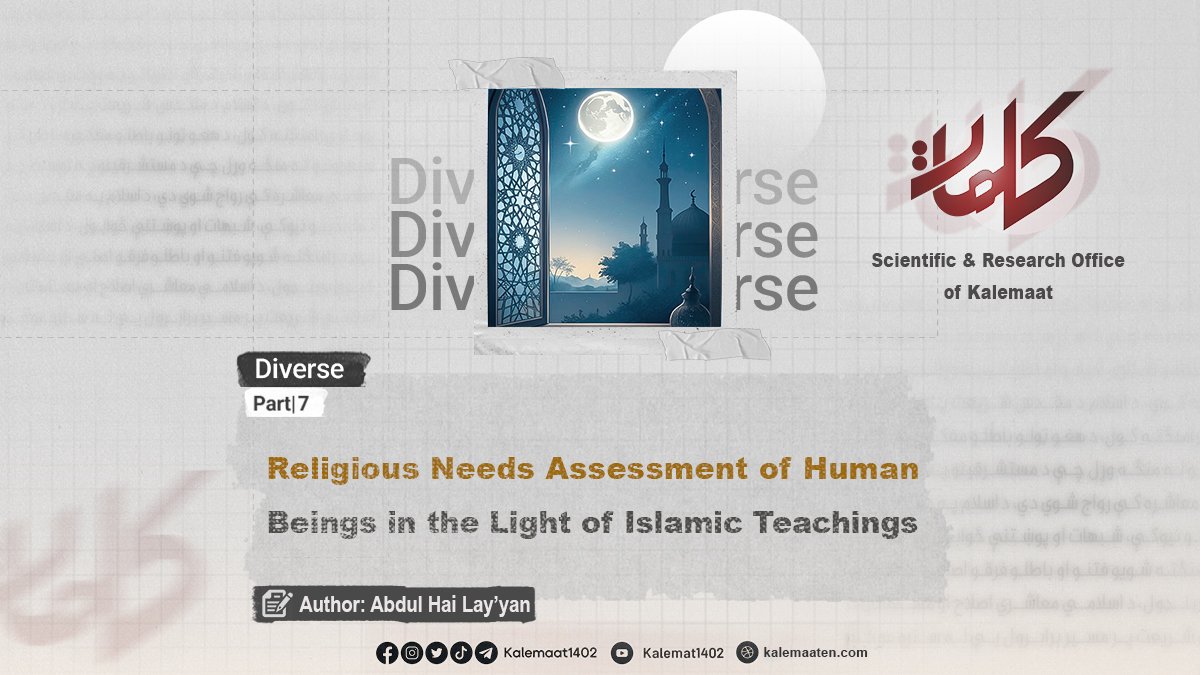Author: Abdul Hai Lay'yan
Religious Needs Assessment of Human Beings in the Light of Islamic Teachings (Part 7)
Topic Three: The Creator of the Universe
Reflection and contemplation upon this vast universe and its creatures — the harmony of their movements and the perfect coordination among its parts — make it clear to any thinker that all this cannot be the result of mere coincidence. There must indeed be a Creator and Sustainer behind it all.
When an observer examines the state of the universe, he sees that everything within it is made with purpose, that all beings are created, and he perceives the variety in their forms, functions, and abilities. He understands that all these came into existence after nonexistence, and realizes that the ongoing progress and movement within the universe indicates that life and motion were preceded by a state of nothingness.
Therefore, the motion of the universe and its beings must originate from a mover, and life, which came after nonexistence, cannot have emerged from the beings themselves. It must have come from something other than them, for all of these are created — and the created cannot bring itself into existence. To bring into being is the act of one who is not created, for any possible being does not possess existence by itself. (1)
If its existence were from itself, its existence would be necessary, and if it were necessary, it would not accept nonexistence. Yet, since it does accept nonexistence, its existence is not from itself.
Thus, every existing thing either needs another for its existence or does not. If it needs another, then its existence is not from itself but from that which it depends on. And whether it depends on itself and that other, or on that other alone, in both cases its existence is not self-derived.
The human intellect, when observing the world, finds evidences and signs that lead it to realize that there must be a Creator and Sustainer for all of it. It is sheer foolishness to deny His existence on the pretext that He cannot be perceived through the senses, for what a person knows is not limited to what he perceives through his five senses — hearing, sight, touch, smell, and taste.
There are many certain sciences that humans cannot perceive directly through any of their senses but grasp through intellectual inference based on sensory observation — such as understanding the existence of the soul through its observed effects. Similarly, the existence of created beings that once did not exist is conclusive proof of the existence of the Creator who brought them into being.
A Bedouin was once asked: “What is your proof that the world has a Maker?” He replied: “Camel droppings indicate the presence of a camel, and footprints indicate that someone has passed by. Then does not this lofty sky, with all its precision, and this lowly earth, with all its density, indicate an All-Knowing Creator?” [2]
Reasoning from the effect to the cause is a well-established intellectual method. The existence of an effect indicates the existence of a cause preceding it. That every created thing requires a creator is an innate and self-evident truth upon which Allah has fashioned the nature of His servants. Sound reason also affirms that a created thing cannot come into being without a creator.
To claim that something originated without a cause is rejected by the necessity of reason. This principle is deeply rooted in human nature. Even a child, if struck and asked, “Who hit you?” and is told, “No one did,” his mind refuses to accept that a blow could occur without a doer.
For this reason, if anyone claims that a written text, a building, a tree, or anything similar came into existence without a maker, any rational person would regard him as either insane or a sophist — one who denies self-evident truths and necessary knowledge.
It Is clear that the created cannot bring itself into being. Before its existence, it was nonexistent; it was nothing. How, then, could what be nothing bring something else into being — let alone bring itself into existence? [3]
The Qur’an states: «أَمْ خُلِقُوا مِنْ غَیرِ شَیءٍ أَمْ هُمُ الْخَالِقُونَ * أَمْ خَلَقُوا السَّمَاوَاتِ وَالْأَرْضَ بَل لَّا یوقِنُونَ.»(4) Translation: (“Were they created from nothing, or were they themselves the creators? Or did they create the heavens and the earth? Nay, they have no firm belief.”)
This verse presents a comprehensive argument: Were they created without a creator who made them? This is rationally impossible at the outset. Or did they create themselves? This is even more impossible and absurd. Therefore, it becomes evident that they must have a Creator who brought them into existence.
This truth is both innate and self-evident. No one with a sound nature can deny it. No one can claim that something created came into existence without a maker, nor can anyone say that it brought itself into being. [5]
Continues…
Previous Part/ Next Part
Reference:
- Ahmad ibn ‘Abd al-Halim, Shaykh al-Islam Taqi al-Din, Sharh al-‘Aqidah al-Asfahaniyyah, Beirut: Al-Maktabah al-‘Asriyyah, 1425 AH, pp. 47–50.
- Ahmad ibn Muhammad ibn Ibrahim al-Tha‘labi, Al-Kashf wa al-Bayan, Beirut: Dar Ihya’ al-Turath al-‘Arabi, 1422 AH, vol. 3, p. 32;
Jamal al-Din ‘Abd al-Rahman ibn ‘Ali ibn Muhammad, Ibn al-Jawzi, Zad al-Masir fi ‘Ilm al-Tafsir, Beirut: Dar al-Kitab al-‘Arabi, 1422 AH, vol. 1, p. 362.
- Ahmad ibn ‘Abd al-Halim, Shaykh al-Islam Taqi al-Din, Al-Jawab al-Sahih li-man Baddala Din al-Masih, vol. 3, pp. 202–204.
- Surah At-Tur: verses 35–36.
- Ahmad ibn ‘Abd al-Halim, Shaykh al-Islam Taqi al-Din, Al-Radd ‘ala al-Mantiqiyyin, Beirut: Dar al-Ma‘rifah, n.d., p. 253.



